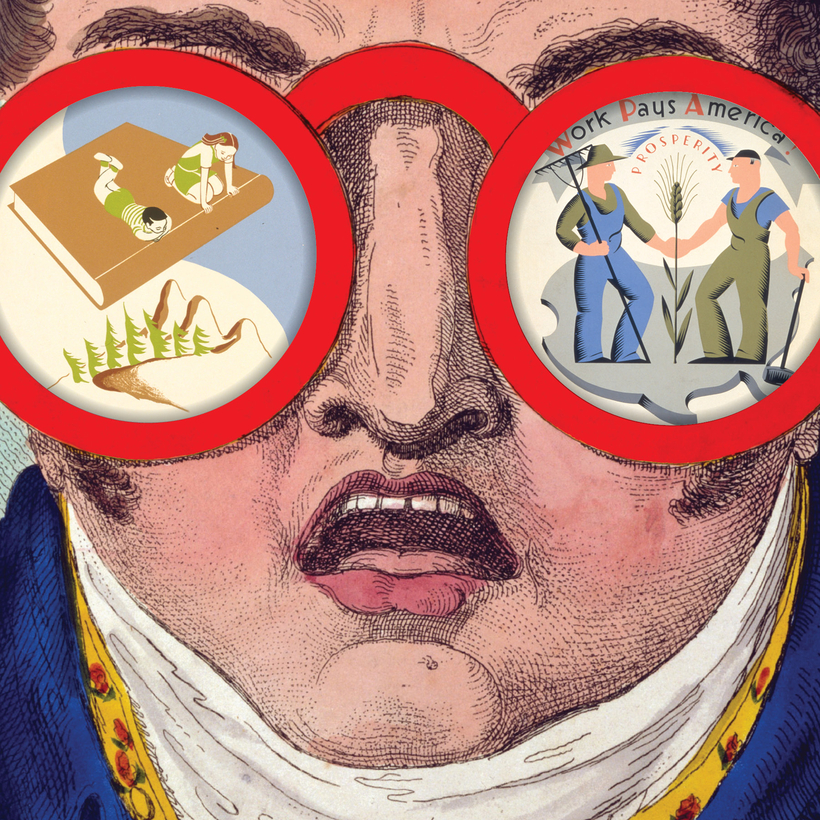In 2023, Lucinda Carroll graduated from Vassar College with a degree in geography. But rather than pursue a job in that field, or in one of the school’s most popular career paths—finance, education, and medicine—she opted to break down 150-pound pig carcasses at Hudson & Charles, a whole-animal butcher in Manhattan’s West Village. Today she’s doing the same at Prospect Butcher Co., in Brooklyn. Her dream is to one day open her own shop.
Carroll is not alone. To the surprise of some pearl-wearing, Yale-marrying Vassar graduates of decades past, starting a professional life with a manual-labor job is becoming increasingly common for recent graduates of liberal-arts schools, including Bard, Barnard, Pitzer, Middlebury, and George Washington University.
“I am seeing an uptick in the number of résumés that include WWOOF-ing [World Wide Opportunities on Organic Farms, a network of national organizations that facilitate homestays on organic farms] and workaway experiences,” says Stacy Bingham, Vassar’s associate dean for career education, who recently worked with a senior “who is pursuing a career in cheese-making and butchery.” Tracy Himmel Isham, senior associate director at Middlebury College’s Center for Careers and Internships, adds that “there is a huge trend amongst … Gen Z to be looking for post-graduate employment that contributes to ‘meaningful work.’”
Seemingly disenchanted with the finance and consulting tracks that once defined postgrad success, graduates are trading desk jobs for physically grueling blue-collar work that rarely pays more than $50,000 a year. “I do this because I find it far more fulfilling,” says Carroll. “It’s about not choosing greed.”
For many recent graduates, the decision to pursue this type of work is driven by concerns over the environment. They are enraged by society’s indifference to climate change and frustrated with the bureaucracy of nonprofits, looking instead for meaningful work in farming and sustainability-focused businesses.
Raised on Sanibel Island, near Fort Myers, by a father who is a biologist, Emma Neill grew up having conversations about climate change. By the time she arrived at Middlebury College, in 2018, she had already inherited a passion that echoed her father’s, and she decided to major in conservation biology. “Everybody agreed we should protect the environment,” she says.
But after years of assisting professors with research on aquatic stream insects such as crayfish and dragonflies, Neill felt burned out and anxious about the isolated lab work that awaited her. “I was kind of jaded about school and ready to get out of academia,” she says.
Now two years out of college, Neill, 25, is a seasonal employee at the Oregon Department of Fish & Wildlife, a Salem-based government agency devoted to protecting animals and their habitats and restoring eco-systems. In the summer and fall of 2023, she traveled across the state as a field technician, wading through streams to collect data on native mussel and salmon populations, inspecting salmon carcasses to ensure they were suitable for returning to rivers to naturally replenish nutrients, and helping to release eggs from spawning fish into riverbeds.
“[It’s] physically demanding and exhausting,” Neill says of the work, which pays “a livable wage, but barely.”
Last year, she broke her leg when a riverbank collapsed underneath her, and she has been on temporary disability leave since. Still, the job offered her a connection to something concrete. “Every salmon I counted or carcass I processed was a part of the natural order. And the data I was collecting would go back to legislation that was important to keep the species alive.”
Environmental change isn’t the only motivating factor. For some, frustration with the establishment is fueling a desire to step outside predesigned structures altogether. “You can do all this work, and it’s just impossible to see any tangible difference,” Carroll says, reflecting on the climate-change protests she joined and the environmental club she led at Vassar. “The only thing that would work for any sort of environmental justice is a complete overhaul of American capitalism. That’s it.”
Similarly, for Nick Tyre, 27, the shift to physical labor was driven by a loss of faith in the potential for change within institutional settings. Growing up in Greensboro, North Carolina, he saw his parents struggle financially but knew early on that a high salary wouldn’t be his measure of success. After graduating from George Washington, in 2020, with a degree in international relations and a minor in sustainability, he had planned to join the Peace Corps. When his program was canceled, due to the coronavirus, he pivoted to working on U.S.A.I.D.-funded projects such as CARE, a nonprofit fighting global poverty by empowering women and girls.
He quickly grew disillusioned. “Senior staff seemed disconnected, like they weren’t getting much out of their jobs,” he tells me. One of his colleagues even said that the most important work in the office was in the fundraising department. (In light of Trump’s rollback of major climate policies and environmental protections, along with funding cuts to N.G.O.’s and government agencies including U.S.A.I.D., the incentive to stay away from these types of jobs has only increased.)
Having spent time on farms throughout his childhood, Tyre recalled that even the elderly couples who had worked the land their whole lives “had a better handle on themselves and their impact on their world.” So he joined them. He moved back to North Carolina to work at PTB Farm, an ecological-agriculture farm focused on soil health and biodiversity, where he managed the livestock operation, containing and moving animals through pastures to improve soil fertility, plant growth, and animal health. He loved it so much that he told me, “It feels selfish to be doing something that gives me instant, tangible gratification.”
After two years, Tyre’s employers could no longer provide housing, which he depended on. He bounced between jobs, starting at FarmRaise, a company that helps farmers obtain funding, before relocating to New York in 2023, where he took on temporary roles at whole-animal butcher shops. Last year, he joined Sky High Farms, a popular nonprofit in the Hudson Valley known in liberal-arts circles for its curated Instagram page and fashionable workwear line (they have over 34K followers and sell T-shirts for $95 each).
Other recent college graduates have taken similarly unconventional paths. One Colgate University alumna, class of 2021, left her job as an investment-banking analyst at Macquarie to work on a banana farm in rural Australia. A 2023 graduate of the Rhode Island School of Design took a position “Oystertaining,” shucking oysters for the New York–based catering company Red Oyster. And a Hamilton class of 2022 graduate moved home to Buffalo, New York, to work in construction.
Rather than seek high-paying careers, these postgrads are gravitating toward trades that feel ethically grounded and carry little social risk—restoring eco-systems, practicing conscientious farming, selling ethically sourced meats. Instead of remaining in the abstract realm of systems-level change, they take satisfaction in how much impact their bodies can make every day.
College, in their eyes, is not meant to fast-track them into a generic professional career but rather give them time to consider who they are and who they aspire to be. These jobs, they believe, offer one of the few viable ways to live with integrity within a capitalist society they view as harmful.
This moral judgment extends into their broader worldview. They share a disdain for accumulated wealth and a rejection of what Carroll calls “fake jobs.” And they go by the idea that your circumstances matter—if a poor college student pursues a moneymaking profession, it is seen as honorable; if a wealthy student does, it’s greedy. At Middlebury, Neill recalls, “the term ‘selling yourself’ or ‘selling your soul’ came up a lot.”
“I did find that my friends with the richest moms and dads had this desire to make money,” Tyre adds. “I think they wanted to prove themselves to their parents, honestly.” Other postgrads I spoke to who grew up with wealthy parents told me that their decisions to pursue blue-collar work led to major family disagreements.
For Carroll, who grew up in a middle-class household in Nyack, New York, “there was obviously some hesitation at first because I have student debt,” she says, “but we’re mostly on the same page about the fact that going to college wasn’t only about me getting a white-collar job.”
The physical aspect of the job was also fundamental to many of the people I spoke to. “I would feel extremely unfulfilled doing work that wasn’t physical,” Carroll says.
When she was working at Hudson & Charles, Carroll noticed how many of the clients coming in during the day were young men. She began asking them what they did. Their answers, she says, often sounded something like “I manage a team.” On the contrary, she sees her work as leading to something concrete. “If there’s no food, there’s no economy,” she says. “If there’s no Microsoft Teams, there’s still an economy.”
And, for her and Tyre, some of the job’s appeal lies in its cool factor. With the work comes an aesthetic—both have nose rings, Carhartt clothing, and baseball caps—that not only signals their trade to the public but complements their sense of self. Carroll, who is a lesbian, jokingly admits that it was the “butch and cool” traits of butchery that first drew her to the profession.
Ultimately, however, what is seemingly pushing these postgrads into blue-collar lines of work is the moral dimension. “There’s the noble aspect of it,” Carroll says. “When I get to the pearly gates, I have a better chance of getting in than some dude who worked at a finance firm.”
Jeanne Malle is a Junior Editor at Air Mail


